#Homeric age
Text
Fun fact: While reading the Homeric Greek prototype of the Iliad, I noticed Homer mentions numerous times the words μύες (muscles) and nerves (νεύρα), and many organs of the human body. The words not only are identical to the Modern Greek equivalents but also bear the exact contemporary anatomical meaning. There is also the mention of bones (οστά) of course, which is not as impressive since bones are easily comprehensible, but in my opinion the fact that apparently ancient Greeks of the early archaic period were aware of the nerves and their function more or less is very fascinating. There is often the mention of shearing or cutting muscles, tendons or nerves.
I searched a bit about in on the internet and found this:

From Hektoen International.

From PubMed, Anatomical references in Homer’s Iliad.
#greece#Homer#Iliad#Ancient Greece#Homeric epics#Homeric age#archaic period#greek language#greek culture#thoughts#random
140 notes
·
View notes
Text
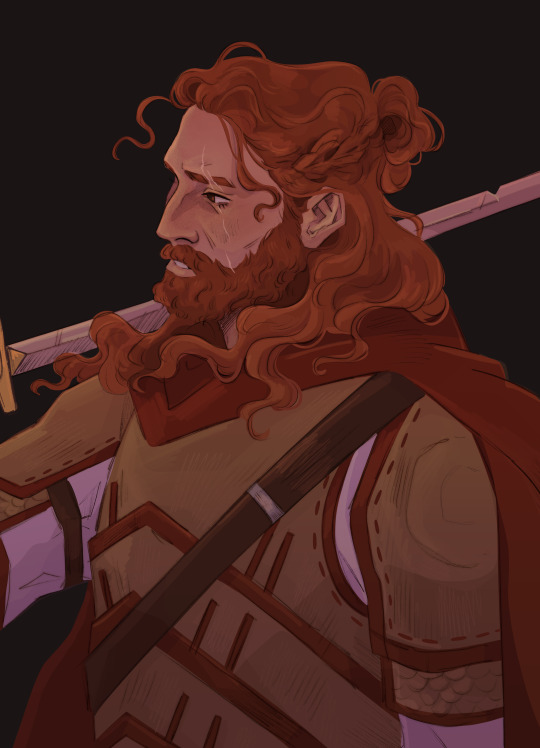
Long hair won out in the end rip all the short haired Menelaus truthers
Art used as reference from littleulvar on twitter: https://twitter.com/littleulvar https://twitter.com/littleulvar/status/1210636583713591296
#His hair is looking ORANGE#Homer like his hair is auburn :/ it’s auburn if u reduce the saturation smh#He turned out weirdly viking esque?? I think it’s the braided hair ??#Majestic if I do say so myself#Menelaus#greek mythology art#my art#the Iliad#trojan war#Greek myth#a#Also an ATTEMPT was made at Bronze Age armour#I don’t know if my reference was reliable#fuck it we ball
4K notes
·
View notes
Text
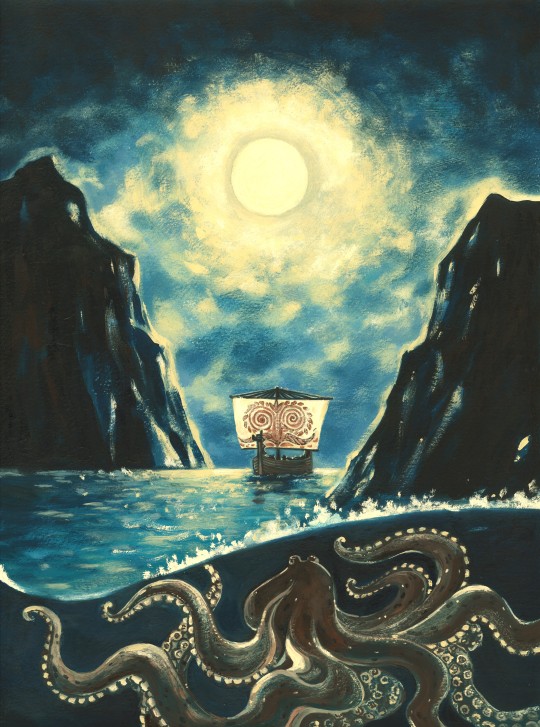
Between Scylla and Charybdis (Odyssey) 2024
#marysmirages#ancient greek mythology#mycenaean greece#odyssey#scylla and charibdis#odysseus#bronze age#painting#iliad#octopus#ship#homer
578 notes
·
View notes
Text
happy father's day i'm thinking about this outis line again

I always thought it was a bit out of pocket considering this isn't too long after the events of Canto III, even with how Outis was being harsher this Canto.
But I then I remembered that Outis' son is the same age as Sinclair.
Her son, who thinks that she died in the Smoke War (the in universe equivalent to the Trojan War as depicted in the Iliad and the Odyssey) because she hasn't been home in years. Her son who cannot cry out to her. And her son, who is currently in much the same position as Sinclair regarding his self-perception and ability to fight, as Telemachus refers to himself as "a weakling knowing nothing of valor" (Book 2 of the Odyssey, line number and exact wording depend on translation).
I think this line reflects more on Outis and her anxieties about her family thinking that she's dead, as well as a reference to Telemachus experiencing his own journey to manhood, much like Sinclair.
I think there's also things to be said for the parallels between Sinclair and Telemachus, even just the ones imagined by Outis. Hell's Chicken had her showing a very paternal worry over his diet (raise your hand if your dad has ever said you'll be short forever if you don't eat right). Overall, even though Sinclair and Telemachus only share the bones of a coming of age narrative, Outis is seeing connections there because she misses her family.
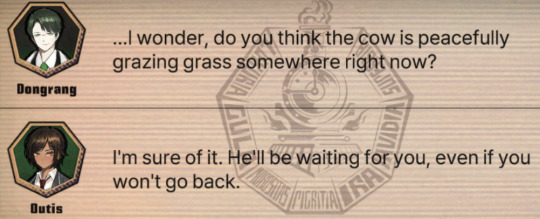
As with this one. Again, she's showing her hand more than she means to. Though she's talking to Dongrang, I think she's also talking to herself. Trying to reassure herself that home will always be waiting. Dongrang, however, decides not to return, but to pursue glory no matter who he hurts in the process. The Odyssey also contrasts the pursuit of glory with the desire to return home. Odysseus has to choose humility in order to return.
Outis has been keeping up a careful persona around us, but it's slipping. Her desire to return home is seeping through even as she tries to assert herself by clinging to the glory from a war that's long since ended.
#limbus company#outis lcb#outis makes me insane i need to bite something#outis is canto 11 going by release order... that's so far away#penelope and telemachus i need to think about them and see them#rotating them in my mind every day#and. i can't unpack homeric ideals of masculinity with how the odyssey treats telemachus' coming of age and#how that's going to influence outis' writing and how she treats sinclair. because that would take way too long#but y'know#that's another post. and that's also a post about gender. like. i can see the title now#Homeric Masculinity. Butchness. and The Meaning of Manhood: a Closer Look at Outis' Gender in Limbus Company#i title my shit like academic articles do not @ me#like. i know gender isn't really a factor in the city. but from a meta-textual level i think it's interesting and i'm a butch lesbian so#also this is a scheduled post. i am scheduling it for fathers day because i would not remember otherwise. so hi from the past
472 notes
·
View notes
Text
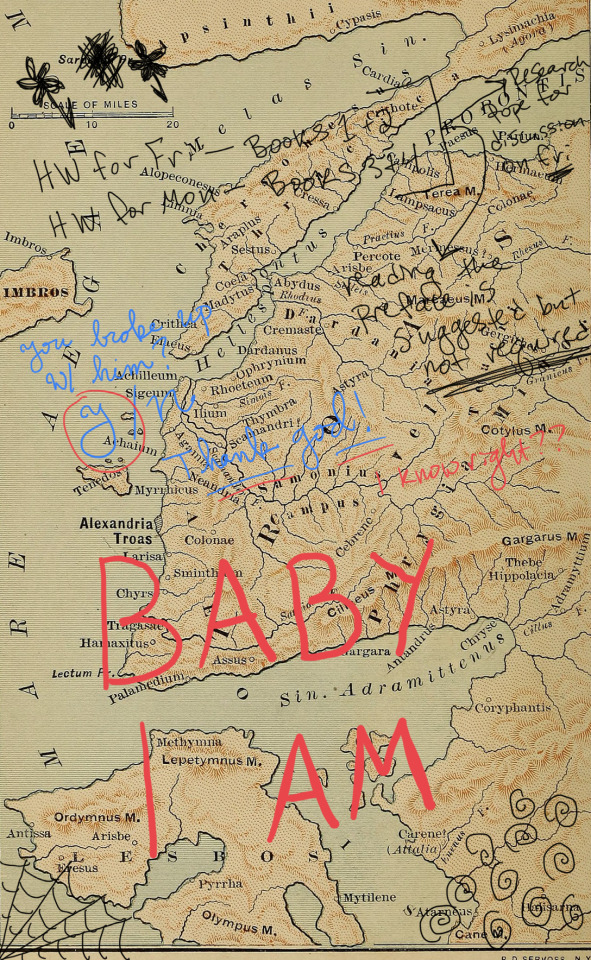
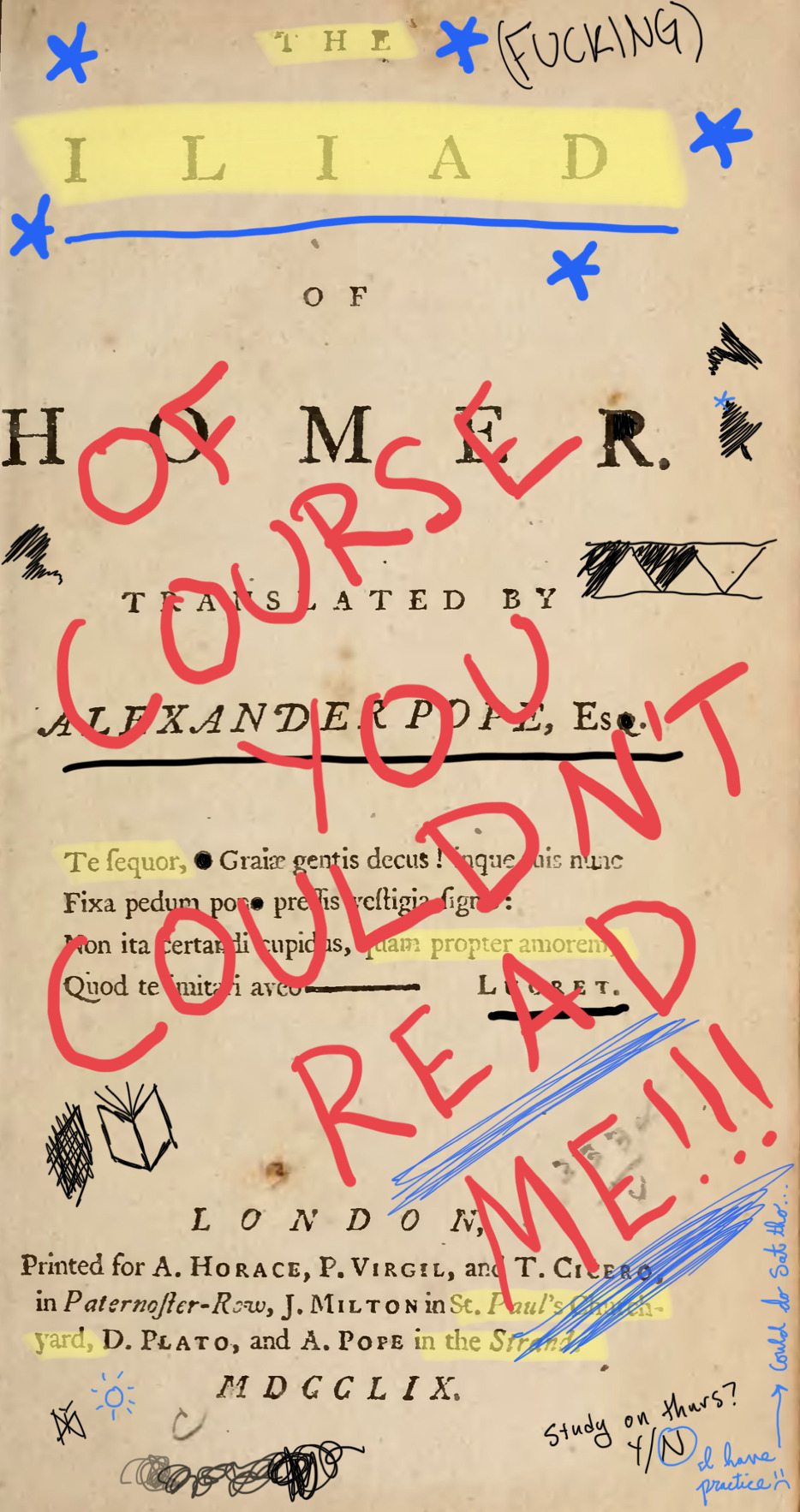
Pages from The Iliad, translated by Alexander Pope // Coming of Age - Maisie Peters
#a bit different from my usual stuff but i hope y'all like it anyway!#i'm starting a new job today so i didn't have a ton of time to edit something - sorry!#the iliad#homer's iliad#alexander pope#coming of age#coming of age maisie peters#good witch#the good witch#the good witch maisie peters#tgw#maisie peters the good witch#maisie peters tgw#tgw maisie peters#maisie peters#art#art history#lyrics#lyric art
189 notes
·
View notes
Text


Homer and cinnamon buns
#studyblr#studying#reading#bookblr#bookworm#dark acadamia aesthetic#academia aesthetic#study#study motivation#books#it takes me ages to read anything because i can't just read one book at a time#light academic aesthetic#light academism#light acadamia aesthetic#light academia#coffee#the iliad#homer#pale bitch#coffee shop#cafe aesthetic#i've owned a copy of Bleak House for 7 years and haven't finished it#bookish#booklr#go read a book#bookstagram#book stuff#bookstore#book posting
679 notes
·
View notes
Text

Homer by Rembrandt van Rijn
Dutch, 1663
oil on canvas
Mauritshuis, The Hague
#Homer#history painting#Iliad#Odyssey#Rembrandt#Rembrandt van Rijn#Dutch#art#painting#baroque#Dutch Golden Age#Mauritshuis
125 notes
·
View notes
Text

The Death of Elaine by Homer Watson
#homer watson#art#arthurian#elaine#chivalric romance#romantic#camelot#river thames#england#castle#medieval#middle ages#mythology#alfred lord tennyson#king arthur#sir thomas malory#le morte d'arthur#boat#oarsman#broken heart#love#history#chivalry#romance#castles#clouds#moon#lancelot#letter#alfred tennyson
108 notes
·
View notes
Text
Genuinely wish there was one (1) single modern retelling of Hades and Persephone in which Hades isn't 10,000 years old and Persephone isn't one day past her eighteenth birthday
#and she's always tiny and short and petite and naive#lore olympus cough cough#I want kick ass persephone#and himbo hades#and they're both the same age#or she's older!! would love that#hades#persephone#hades and persephone#homeric hymn to demeter#demeter#Kore
106 notes
·
View notes
Text
Me,a starstruck 15 year old reading the Odyssey for the first time : *sighs* wish I was born in 12th century BCE so I could see Troy and-
The fucking Sea people: BRING US THE GODDAMN WARSHIPS
#pLEASE#the sea people theory haunts me in my dreams#keeps me up at night#their origins are highly disputed and we can never put exactly where they emerged from but they wrecked HAVOC#towards the end of the bronze age#egypt under ramses iii was only able to defend itself theres an entire depiction of the battle that was found#they basically destoryed so many major cities including troy#we know this becuase theres a layer of charcoal in thr ruins of troy#when you think about it actually#its very easy to see how homer wrote the illiad and odyssey#because he grew up during the dark ages of 400 years where he was surrounded by these ruins#and he was like “fuck it might as well write a fanfic”#okay#i will shut up#homer#the illiad#the odyssey#bronze age civilisation#12th century bc#sea people theory#and vampy ranting about history
59 notes
·
View notes
Text

323 notes
·
View notes
Text
Some thoughts on the Homeric Age and the Early Archaic Period
Based on my reading of the Iliad and the Odyssey in the original Homeric Greek text and a fairly loyal Modern Greek rendering
I had read these in middle school but, you know, fewer things stick with you when you do them as a chore. I was interested in reading them again, not so much for the already familiar stories, but for what I could take from them and conclude about the Greek society more than 2800 years ago! I must note that it is unclear how accurately the poet(s?) - let’s say Homer - portrays the Homeric Age and events that supposedly took place more than four centuries before his time. The question is, are we truly getting a picture of the Homeric age or at least an archaic Greek society? My opinion is that the epics must have been a reflection of some early Greek era indeed and not be entirely imaginary. Most historians believe Homer does a fairly decent job at preserving cultural and social elements of an age long gone even for him, although it’s undoubtable there is a lot of infiltration with elements of his own times too.
Peace and War
It is interesting that even though the Iliad is a war themed epic and graphic violence and gore are not missed in the Odyssey either, both the characters of the epics (who are famed warriors more often than not) and the poet - narrator acknowledge war as a great evil that causes a lot of pain to people. Even the victors pillaging and taking slaves have total awareness and understanding that a slave or a defeated enemy are suffering a lot. It seems it is a man’s duty to confront that great evil and be decently prepared and trained for it, however it is not a situation that most have a special yearning for. Most men agree that there is nothing like having peace and enjoying your companies and families, however it was a great shame for a man to step back once war broke out. A war or a fight or any argument would be ignited usually by acts of injustice or great offence that should be obligatorily punished immediately, even if the offended would deep inside rather stay at home. As an example, Odysseus murders violently all of Penelope’s suitors and twelve girl slaves who betrayed his wife and slept willingly with them. He does not waver at all, despite the pleas for mercy. When his oldest servant and nanny sees the gruesome scene with all the dead, she rejoices and cheers. Odysseus then scolds her, for “anybody’s death should never be a reason for joy”. So we have this somewhat contradictory stance in a society which proclaims itself peaceful and fair yet it takes too little to outrage and urge at acts of vengeance and violence. Violence and war are seen as measures that must be taken and that one must not recoil from but there is wide acknowledgment that war and death brought to others should not be desired or enjoyed. It was definitely not among cultures that viewed war or conquest as some sort of sacred destiny or pride. But it also did not take much for them to find excuses for a war or a fight.
Religion
Despite misconceptions that Ancient Greeks were always very anthropocentric and put logic and the potency of the human mind above all else, it is certain that at least up to the Archaic period this was not the case. Ancient Greeks of those early eras were very religious and attributed almost everything to their deities. The fate of a person is sealed from the beginning and the gods are well aware of it. Even the achievements or mistakes of great people are viewed as interventions by the gods. Although Odysseus is repeatedly praised for his intelligence and resourcefulness, it is almost always a god (Athena) who enlightens him on how to act or what to say. Misfortune is also entirely attributed to the gods - if a character suffers great misfortune, it is not so much because of their own misjudgment, the elements of nature or ill luck, but because some god is angered with them or has a special liking for their enemy.
Behavioural patterns
The most notable pattern in the behaviour of characters in the epics is that it is temperamental with plenty of mood swings. Granted, we should always keep into account that they are just ancient poems and maybe the care for gradual character development or realistic character consistency was not one of the priorities for ancient poets. If we do however still attempt to draw any conclusions, we observe people who are quick to judge, offend, get angry, praise, admire, get emotional, forgive. Some of these mood swings happen in minutes. Certainly this must not be realistic but it may be a sign the Ancient Greek people were that temperamental, quick to hate and quick to love. Another crucial observation, maybe a trademark trait of the Greek ethnos, it is apparent throughout the epics that the Greeks are people who love to talk a lot, they are argumentative and they enjoy discourse. Characters unfold their thoughts and feelings extensively and they do not shy away from being vulnerable. Furthermore, their speeches are bold and often candid; they can use strong language for the flaws of people they love and they add praises even in speeches against their enemies! In other words, they generally call it what it is - they are upfront about the flaws and the virtues of those they speak to. One last observation, they tend to be suspicious of others. There is an ongoing theme of trying, testing old friends and loved ones even when this is distressing to the other person and even though the events alone prove those people’s love and testing them really is superfluous and just shows a very suspicious, disbelieving nature. Of course, testing your loved ones is a huge recurring theme in international literary work ever since, therefore once again it would be reasonable to consider that even if those tendencies existed, they were exaggerated for the sake of the poems and the prolonged entertainment of the audience.
Objectivity
Perhaps the most fascinating aspect of reading the Homeric epics for me is how the author is largely removed from taking sides. Homer does like Odysseus, that is evident, however as a narrator he almost never speaks ill of any character. Any accusations are only made by characters against other characters. The narrator himself acknowledges positive traits in most characters or at the very least remains neutral. Even more interestingly, this expands to an ethnic level. Even though the epics are written by a Greek for the Greeks, there is resolutely no hatred or prejudice against any other culture mentioned. Trojans, Thracians, Aethiopians and many others are all acknowledged for their own virtues each and the narrator does not resent any for fighting against the Greeks. It is clear that at the time, discrimination and hate speech against other nations and cultures had not yet gotten to people’s minds that much. I found it very wonderful and interesting that a war text from 800 BC could master more objectivity and level-headedness than 99% of texts written in the 19th century around the world.
Women
[This part is a little longer so I am putting the rest of the post under a cut]
Classical Greece is notorious for how oppressed its women were, however either things were better for them a few centuries prior or the truth was more nuanced. Of course, we are undoubtedly talking about a deeply patriarchal society in which women were expected to restrict themselves in their own rooms and have little concern besides their kids and weaving. In spite of this, the poems are full of considerations and respect towards numerous women and seem to have them in a type of regard that is rarely mentioned in historians’ documentations. Women are portrayed with diverse personalities and the vast majority are presented as positive role models. In fact, there is only one woman who is mentioned in a downright negative way and that is Clytemnestra, but it’s only her husband who does this as well. Other than her, there is rarely if ever negative talk against other women. Even Helen is never treated badly by anybody; Helen is only ever criticised by herself. When she returns to Sparta, her people, Menelaus and visitors such as Telemachus seem to honour her as if nothing ever happened. Helen joins them in their festivities, is portrayed as more perceptible than Menelaus and always voices her thoughts in the overwhelmingly masculine company. Arete and Nausicaa are also significant female characters and they are more crucial to the safe return of Odysseus than King Alcinous. Penelope is one of the leading characters; her thoughts, feelings and turmoil interest the poet (and apparently the ancient audience) in a large part of the Odyssey, no less than the feelings of Odysseus himself. The input of women is often welcomed and considered - it is not taken into account usually when it gets in the way of plans that have to do with war and fighting or when the position of a male might be challenged in front of others. For example, Telemachus evidently loves and respects his mother but he eventually feels ashamed that he is becoming a grown man, the future king, that cannot get rid of his mother’s suitors and he often scolds her when she takes decisions regarding these matters in his and the suitors’ presence. Other than that, mothers in general are viewed as sacred and respectable. Odysseus, a mature manly warrior, is seen yearning for his mother’s embrace.
In Nausicaa we see that perhaps women could also go outdoors and have fun when accompanied by their maids. Nausicaa and her maids wash the clothes close to the shore and in the meantime they entertain themselves by playing with a ball until the sunset, with the permission of her parents.
The pain and turmoil of slave girls is seen and understood. Odysseus kills twelve of his fifty slave women because they betrayed him. The rest who remained loyal to the family rush to welcome him back - Odysseus hugs them all and weeps. This scene is beautiful because there is nothing resolutely sexual implied - it is clear that his relationship to them was more genuine than that of a master and his servants, they were also his protégées. He cared enough to weep for meeting again his female servants - this shows that even an unfree working girl could be impactful enough to a powerful man’s life without this necessarily involving sex. The slaves he killed received a shameful death but even so Telemachus explains to them why such a death is chosen for them as if he tries to excuse it. Meanwhile, there is not any hint of apologism when it comes to the gruesome amputation and murder of the male traitor. It seems it was viewed as more dubious for a man to kill a woman, whereas a man killing a man was viewed as a punishment or as a heroic act, depending on the context.
Goddesses are portrayed totally unapologetic; they clearly have the freedom to do morally questionable deeds without being judged by the mortals’ standards.
One very interesting detail is that when men converse with women, which happens a LOT in the Odyssey and not just between married couples, men often refer to gods as husbands of goddesses. For example, when Odysseus talks to Nausicaa or Penelope, he addresses Zeus as “Hera’s Zeus”. This is clearly a subtle attempt at honouring the woman the man is talking to - it stresses that even a god belongs to a goddess, even the father of all gods, is Hera’s man. This is not to question Zeus’ leadership among the gods or portray males as possessions of females but it is a way to respect the woman opposite them by acknowledging their own influence and importance. “Even Zeus is Hera’s Zeus, therefore I have the highest regard for you, my lady.” I believe this was the spirit and I thought it was a wonderfully subtle way to show regard for a woman.
Love, lust and sex
What I found the most interesting regarding romantic relationships is the impression I got that emotional connection and respect seemed to be more telling of someone’s devotion than physical intimacy. It seems that married men could get away with having sex with slave girls (not free women) as long as they did not sleep in the same bed or maintain a deeper emotional relationship with them. For Helen, it seems it was worse that she followed Paris away rather than that her being with him included having sex together. There is also totally the concept of casual sex of which goddesses seem to have a good understanding. Mortal women on the other hand can openly voice their sexual desire and take the initiative to have and enjoy sex but only when it is with their husband, but they are sometimes depicted to have willingly casual relationships (Odysseus’ working girls with the suitors), which is however a choice that is fatally punished by the master once he returns. However, it wasn’t so much the act of casual sex they got executed for but more so that it was with the suitors who were exploiting Odysseus’ riches and loved ones. There is a distinction in the Odyssey between women who eagerly entered sexual relationships with the suitors and others who were raped by them. I don’t claim it was entirely clear but to my understanding, the latter welcome Odysseus back and are not punished. Another interesting fact is that although Penelope is admired for her loyalty to Odysseus, she was not in fact socially obligated to grieve him for so long. Telemachus himself declares he is happy his mother is so loyal to her husband, however he would also be okay with her marrying somebody once he became of age. (It would also be convenient as the suitors would finally leave him alone.) Both Telemachus and the suitors repeatedly leave it to Penelope herself to pick whomever she fancies best, with the optional advice of her father. There is a small part that suggests some people would still gossip negatively if she took a new husband, however it was clearly totally acceptable for her to do so. Just like Penelope, Nausicaa, a maiden, is always concerned about what people will think, however when alone with Odysseus or her maids, she makes her attraction to him discreetly clear. I also found the men’s approach to love and sex very interesting. Men are depicted equally as capable of sexual desire, abstinence, indifference or even being sexually coerced. By the standards of the era, Odysseus is really as loyal to Penelope as she is to him, given that his infidelity was with two goddesses, one with a notorious love for potions and another who clearly kept him her prisoner.
When he returns to Ithaca, he keeps up a stone-faced fake identity for too long but when he reveals himself, he gradually becomes frustrated with Penelope’s cold and doubtful reception. We are told that apparently Odysseus was very invested in his marriage with Penelope, given the strenuous work he willingly did with his own hands to build and decorate their bedroom. When the couple reunites, Athena literally has to prolong the night for them to just weep together, cuddle, tell their sufferings (and have sex) enough. It just gives us a picture of a mutually respectful marriage where the wife is just as invaluable to the husband. Men are also depicted to have shame for their nudity, which is something that might seem surprising given the classical obsession with the body. Odysseus feels it is shameful, vulnerable and inappropriate to be seen, touched or washed by female servants, especially when he is significantly older than them. He also feels embarrassed for his looks under the female eyes. Lastly, in the Homeric epics women are ultimately the object of men’s desire. There is actually no mention of homosexual attraction. The only questionable moment, on which the entirety of the later speculations were founded, is when Achilles has a dream of deceased Patroclus and he express his wish to die and be buried together. Other than that, having sexual desire is exclusively expressed for women or, interestingly, by women in these two epics.
Other types of love such as friendships and familial relationships are full of vulnerability and expression as well. Men, fathers, sons, friends hug, cry and narrate their misfortunes openly and vulnerably. Grown men are still recipients of beautiful kind words as Thetis does with Achilles and as Penelope and even the swineherd Eumaeus, who operates as a paternal figure, do with Telemachus (both call him “sweet light”). (As a sidenote, it is clearly viewed as the right thing for a noble person to be close, caring and accessible to his servants and slaves.) Arete and Alcinous also treasure their daughter Nausicaa.
The most moving part of all, Odyssey might be the first text noting the literally undying love, devotion and wisdom of dogs. While Odysseus at the moment is in disguise and can’t show much affection or then grieve his dog Argos, it is clear that Homer wouldn’t bother adding that part if the Greek people hadn’t already started forming loving bonds with pets.
Stools
Boy they loved stools.
Conclusion
If there is any accuracy in Homer’s epics, then the late Homeric / early Archaic society was a society that generally tried to be peaceful and always measured the profit and cost from a war expedition but the equilibrium was really fragile and very often disturbed. People were religious, opinionated, argumentative, talkative and temperamental but they also valued loyalty, honour, hospitality, patience and bravery. They loved dearly and were fearlessly expressive, however they were also quick to anger and suspicion. It was a very patriarchal society, however women had their own way of being respected and reckoned. Sexual desire was seen as natural and expected in both sexes, however there were limitations to how upfront or open it could be in its expression. These limitations affected both women and men, but to different degrees or ways.
BONUS!
An examination of similarities and differences between this society and later / current stages of Greek society:
Some obvious similarities are that Greeks have indeed always been temperamental with considerable mood swings and a tendency for suspicion. There are hints of cryptical behaviour in the epics though and I would say that later and current Greeks are also notable for this (contrary to popular belief). Modern Greeks are less capable of objectivity or seeing the virtues of an enemy. The double, often contradictory approach to sex, where promiscuity and modesty collide, are an eternal trait of the Greek people. While it might be on the lower end of the western world spectrum on the matter, it is needless to say the woman’s status in the society has improved hugely. However, there is this common pattern that historically Greek women were often able to be much more influential or assertive than the laws or the “norms” expected them to be. Greeks have always loved their families fiercely. The next might come as a surprise but I firmly believe modern Christian Greeks are much less GENUINELY religious than Homeric and Archaic pagan Greeks were. Later Greeks (probably starting since late classical period and ever since) do not attribute nowhere near as much of their achievements and failures to a deity. The Greek approach to Christianity however is similar in the sense that there is an expectation of an immediate godly payback involved just like ancient people expected the favour of the gods with their sacrifices or appropriate behaviour. As time passed, Greeks became distinctly less and less interested in war and fights, despite always remaining argumentative. Modern Greece is a genuinely peaceful society that avoids confrontation but has some basic standards of good defensive preparation in case of bad need, while the ancient society was violating its own boundaries of peace very often and much more readily.
#greece#Ancient Greece#Homeric epics#Iliad#odyssey#Odysseus#Homeric age#archaic Greece#Homer#Greek culture#opinion
24 notes
·
View notes
Text
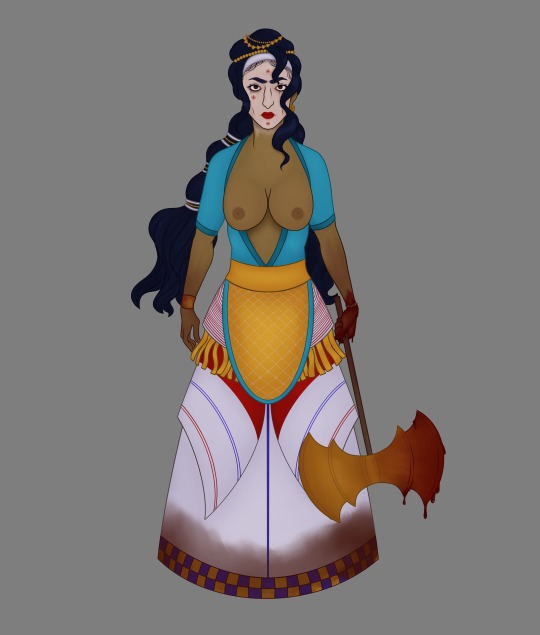

I decided to redraw Klytemnestra, click for better quality! Original is from last year! A few of my refs are under the cut, but I used so many I couldn't include them all!


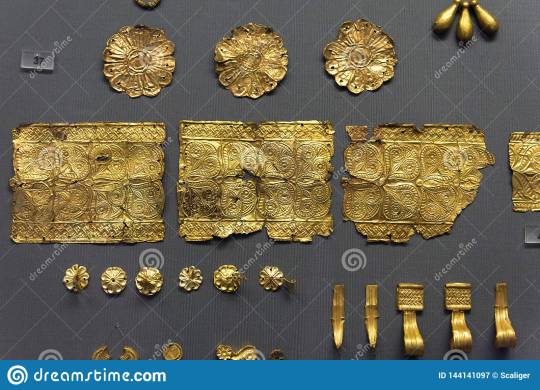
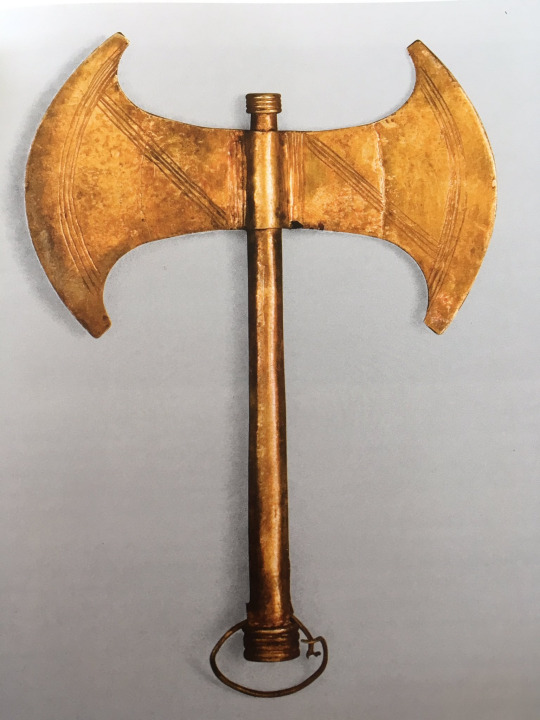
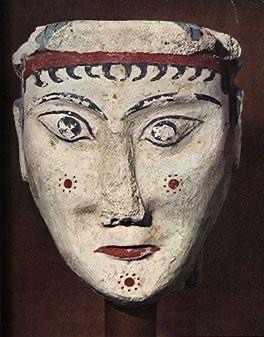

#this is the drawing that got me called racist against white people last year#and got me my first anon hate!#Ancient greece#klytemnestra#clytemnestra#minoan#mythology#greek mythology#tagamemnon#mycenaean#bronze age#digital art#redraw#digital illustration#procreate#tw blood#the iliad#homer#Electra#house of atreus#my art#myart
154 notes
·
View notes
Text

Odyssey's ship leaving Ithaca (2024)
Penelope and Telemachus look at Odysseus's ship sailing away...
Illustration for Homer's Odyssey
#marysmirages#mycenaean greece#ancient greek mythology#bronze age#odysseus#odyssey#penelope#telemachus#art#homer#ship#sea#ancientgreece
714 notes
·
View notes
Text
Pet peeve of the day: When leftists treat The Simpsons as proof that capitalism is getting worse. Main characters having far larger homes than they could realistically afford with their job and housing market is a well-established sitcom trope, and then on top of that The Simpsons is a fucking cartoon where a town government can enact prohibition and Homer can become an astronaut with no qualifications and 2 weeks of training, you should not be taking it as some kind of realistic accurate depiction of the average American standard of living in 1989.
#politics#economics#leftism#the simpsons#also people repeatedly bring up that homer didn't go to college#when i could swear that post-golden age they retconned that he did to keep him an average joe everyman as it became more and more ubiquitou#just like how he's gotten slightly older as the average age at which people have kids goes up
39 notes
·
View notes
Text
i’m sure people smarter than me have said this, but the odyssey is the sequel to the monomyth actually. in the hero’s journey the hero departs from home, from innocence, from safety, to fulfil his destiny. in homer’s the odyssey, the war is over, the destiny fulfilled. next comes the real fight, the unwinnable fight—to return to everything you left home to fight for.
in the first half of the poem, while odysseus fights tooth and nail to return home, his home fights with its last breath to give odysseus a home to return to. and time is running out. his wife penelope is down to her last desperate excuse. suitors have invaded his home, eating through his household and his wealth. his son, telemachus, almost grown, leaves home for the first time to find out if odysseus is still alive, if there is still a reason to keep fighting. having lost everything he had, over and over, odysseus is finally allowed to arrive in his homeland. at first he doesn’t recognise it. and he is cursed to look old and decrepit, so that none of his loved ones would recognise him.
for the second half of the poem, he has returned and miraculously, he has not been displaced or forgotten. but now he has to reclaim what was his. and removing the rot, restoring this place to the home odysseus remembers, is long and painful. instead of walking through the front door, he must sneak in through the back or risk being thrown out. not a single person knows him by sight; odysseus must prove his identity over and over, to every member of his household. he must retell story after story, share secret after secret, reveal every marking or scar upon his body, to finally be recognised by his own family. and then he destroys every last trace of the intruders—kills the men, kills the servants, wipes the slate clean.
by athena’s magic, he is restored to his former youth and glory as he reunites with his wife. the families of the slain suitors try to seek revenge, but zeus, lord of the skies, intervenes. odysseus, filled with his god-given strength, is home, and ready to fight to protect it.
it’s a complete sequel to the heroes journey, but what makes it part of the monomyth is the horrible truth about odysseus’ tale: that it’s impossible. that you will leave, and your home will change in your absence, and someone might fill your place; your family won’t recognise you, your wife met someone else, intruders have destroyed your home, and you will never be as young as you were. you will return and you will fight with every ounce of your strength and it won’t be enough to turn back the clock. it’s the terrible last chapter to every hero’s story that we don’t like to talk about.
and yet, of course, it’s the same story we tell over and over: we’ve won the war, now all we want is to return home, but home is no longer somewhere we can reach.
#the odyssey#hero’s journey#the monomyth#greek mythology#odyssey#homeric hyperfixation haze#sorry this has nothing to do with mxtx but i’ve been sitting on this thought about the odyssey for months#like. i’m sure this isn’t a new thought but.#you think of tolkien and the scourging of the shire#all quiet on the western front#narnia#all the chinese poets#i want to go home. but i am home.#think about how the odyssey ends at the very second athena declared the conflict over.#we don’t see odysseus reaction to it. we see him ready to fight. athena declares a peace.#but it is abrupt. as if athena is slamming the window shut. he won he’s happy that’s enough.#does he manage to live after that? we don’t get to know#i was sitting on this thought for ages. and then i read the greek tragedies. was helping my friend with a paper on home by toni morrison#and yeah this all clicked. got irresistible
157 notes
·
View notes